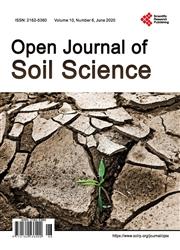Biochar as a Soil Amendment Tool: Effects on Soil Properties and Yield of Maize and Cabbage in Brong-Ahafo Region, Ghana
引用次数: 8
Abstract
Ghana’s soil is continuously declining in fertility due to continuous cultivation and rapid mineralization of its soil organic matter. Previous studies have touted the potential of biochar to help improve soil properties and increase the yield of crops. This study investigated the effects of the application of biochar on physicochemical properties of soil and the yield of maize and cabbage in Ghana. The study indicated that application of biochar significantly increased soil organic matter (SOM) from 3.88% (for control) to 5.72% (for biochar application rate 20 ton/ha and 0 ton/ha of NPK). It also increased soil pH from 6.55 in (for control) to 7.30 (for biochar application rate 20 ton/ha) and 0 ton/ha of nitrogen (N), phosphorus (P) and potassium (K) which can help ameliorate the soil acidity problem of Ghanaian soils. This field study, demonstrated that addition of biochar from sawdust increased the yield (between the control (0 ton/ha of biochar, 0% of recommended dose of NPK) and 20 ton/ha, 0% recommended dose of NPK) of maize and cabbage by 6.66% and 7.57% respectively. This study concluded that application of biochar offers a great potential to improve soil quality and the yield of maize and cabbage in Ghana.生物炭作为土壤改良剂:对加纳Brong-Ahafo地区玉米和卷心菜土壤性质和产量的影响
由于持续耕种和土壤有机质的快速矿化,加纳的土壤肥力不断下降。以前的研究吹捧了生物炭帮助改善土壤性质和增加作物产量的潜力。本研究探讨了施用生物炭对加纳土壤理化性质及玉米和卷心菜产量的影响。研究表明,施用生物炭显著提高了土壤有机质(SOM),对照由3.88%提高到5.72%(施用生物炭20 t / hm2和施用氮磷钾0 t / hm2)。它还将土壤pH值从6.55 in(对照)提高到7.30 in(生物炭施用量为20吨/公顷)和0吨/公顷的氮(N)、磷(P)和钾(K),有助于改善加纳土壤的酸性问题。田间试验表明,在对照(0吨/公顷生物炭,0%氮磷钾推荐用量)和20吨/公顷氮磷钾推荐用量之间,添加木屑生物炭可使玉米和卷心菜的产量分别提高6.66%和7.57%。本研究的结论是,在加纳,应用生物炭对改善土壤质量和玉米和卷心菜的产量具有很大的潜力。
本文章由计算机程序翻译,如有差异,请以英文原文为准。
求助全文
约1分钟内获得全文
求助全文

 求助内容:
求助内容: 应助结果提醒方式:
应助结果提醒方式:


